
Publisher:
Bonnie King
CONTACT:
Newsroom@Salem-news.com
Advertising:
Adsales@Salem-news.com

~Truth~
~Justice~
~Peace~
TJP
Dec-05-2013 13:21

 TweetFollow @OregonNews
TweetFollow @OregonNews
Never Has A Government Investigated Itself And An Admission of Genocide
Parasaran Rangarajan for Salem-News.comUnder any circumstances, there is absolutely no credibility for domestic mechanisms to address “accountability” issues for these alleged war crimes in Sri Lanka as called upon by UNHRC resolutions...
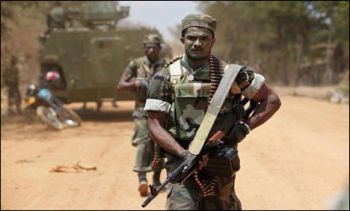 Sri Lankan soldiers during the Tamil Genocide. thenews.com.pk |
(LONDON) - The language of the most recent and prior resolutions against Sri Lanka at the U.N. Human Rights Council (UNHRC) introduced by the U.S. call upon the government of Sri Lanka to implement the LLRC or other domestic mechanisms for “accountability.”
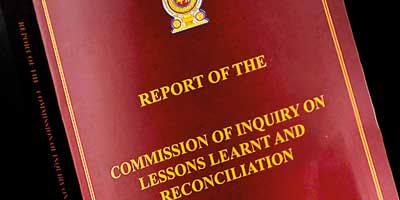 sangam.org |
This is what many other nations including China have requested the government of Sri Lanka to address recently. However, examining the case for utilizing the domestic mechanisms, we find that they are deeply flawed and more so, a government while remaining in power has never investigated itself for such allegations in history, especially one which is “authoritarian” as noted by the U.N. Human Rights Commissioner.
Looking into sections 9.9/9.37a of the follow-up report “National Plan of Action for the Implementation of the LLRC – Responsibilities By Agencies” issued in January 2013 dealing with the accountability, we find that the government of Sri Lanka assigned the task of looking into civilian casualties in relation to violations of international humanitarian law to the Ministry of Defence and Urban Development.
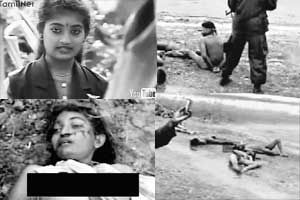 |
The report states it established an Army Court of Inquiry to investigate allegations of these violations within 12 months. The segment states they would investigate the "50 incidents" which far number from the 4000 submissions received according to the “Report of the Secretary-General’s Panel of Experts on Accountability in Sri Lanka” issued on March 31st, 2011.
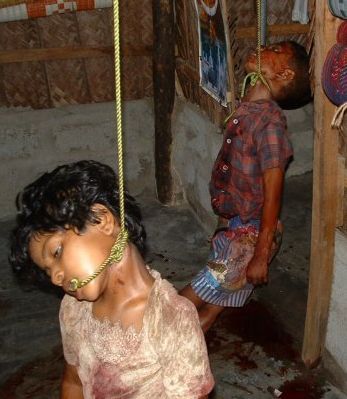 Crimes against Tamils in Sri Lanka |
It is somewhat difficult to believe that only 50 incidents involving violations of international humanitarian law occurred during these military operations. However, utilizing this mechanism in April earlier this year, this Army Court cleared all military personnel and found that there were "zero civilian casualties" as ordered by the President:
This is in stark contrast to the U.N. report where it was found a minimum of 40,000 civilians deaths. The U.N. noted that the LLRC, the military courts, and domestic justice system could not be used for addressing accountability in the existing political environment. Quoting from the executive summary of the U.N. report:
“In sum, the LLRC is deeply flawed, does not meet international standards for an effective accountability mechanism and, therefore, does not and cannot satisfy the joint commitment of the President of Sri Lanka and the Secretary-General to an accountability process.
The justice system should play a leading role in the pursuit of accountability, irrespective of the functions or outcomes of the LLRC. However, based on a review of the system’s past performance and current structure, the Panel has little confidence that it will serve justice in the existing political environment.
Equally, the Panel has seen no evidence that the military courts system has operated as an effective accountability mechanism in respect of the credible allegations it has identified or other crimes committed in the final stages of the war.”
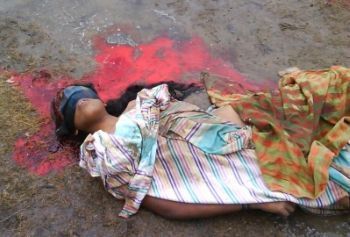 |
This is just one of the many justifications the independent experts of the U.N. panel made for a recommendation for an international investigation to be commissioned. How can we expect an internal probe into "accountability" as called upon by the UNHRC resolutions when the Sri Lankan courts have already ruled that there were no civilian deaths? What exactly would be there for them to investigate or address "accountability" on? The new UNHRC resolution in March must expressly state the establishment of an international inquiry if the organ is to be used.
Furthermore, if we refer to “Cable 10COLOMBO32” from former U.S. Ambassador Patricia Butenis to Sri Lanka and the Maldives noted there has never been a country in history to investigate itself while remaining in power and that these alleged crimes goes up to President Rajapaksa himself:
"There are no examples we know of a regime undertaking wholesale investigations of its own troops or senior officials for war crimes while that regime or government remained in power. In Sri Lanka this is further complicated by the fact that responsibility for many of the alleged crimes rests with the country’s senior civilian and military leadership, including President Rajapaksa and his brothers and opposition candidate General Fonseka."
Ref: wikileaks.org/cable/2010/01/10COLOMBO32.html
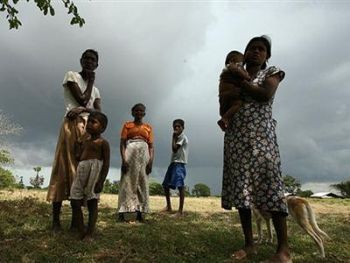 |
This is also contradictory to the new census which has started to count the total amount of deaths during the civil war which is to complete the count by Dec. 20th as expected. This operation is using 15,000 personnel, why is that required when the government only noted "50 witnesses" in April? There is an obvious numbers game being played by the government of Sri Lanka to shield the perpetrators of these war crimes and this census should have absolutely no effect on a call for an international investigation as proprio motu investigations by the ICC Prosecutor have been conducted in the case of Kenya where there were 1000 civilian deaths, a number far short of what happened in the last stages of the war in Sri Lanka.
First, the government of Sri Lanka claimed that all military operations were carried out with no civilian deaths, under international pressure it has agreed to establish a census to come up with a figure to defend itself against that of the U.N. report, and furthermore, the census is just that; a census. There is no guarantee this census, regardless of the number of casualties it quotes, will lead to a credible probe when the government of Sri Lanka has already contradicted itself in legal rulings stating there were "zero civilian casualties".
In addition, in “Cable 09COLOMBO1054_a”, we see that Presidential Advisor Basil Rajapaksa, the younger brother of the President Mahinda Rajapaksa in this authoritarian regime admitted to violating international law as a reason to claim quick victory against the LTTE:
"In response to the "incident's report," Rajapaksa candidly remarked, "I'm not saying we're clean; we could not abide by international law - this would have gone on for centuries, an additional 60 years."
Ref: wikileaks.org/plusd/cables/09COLOMBO1054_a.html
Furthermore, more recently in “Cable 09COLOMBO252_a”, we see Presidential Advisor Basil Rajapksa admitting to shelling the “No Fire Zones”:
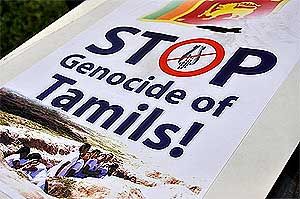
“Ambassador pointed out such retaliatory shelling had killed many civilians and was a reversal of the government’s own commitment not to use heavy weapons. The Norwegian Ambassador commented that in two recent meetings with Rajapkasa he acknowledged military forces were shelling into the safe zone, but was not comfortable discussing the subject.”
This is obviously a valid confessions of violating international law and admitting to genocide. While WikiLeaks cables have been criticized by the U.S. Department of State, former U.S. Department of State spokesperson PJ Crowley himself has cited these cables in the case of Yemen drone strikes.
Under any circumstances, there is absolutely no credibility for domestic mechanisms to address “accountability” issues for these alleged war crimes in Sri Lanka as called upon by UNHRC resolutions as it has never been done in history and proper attention should be given to the admission of violating international law by the government of Sri Lanka’s top diplomat in an international investigation.
Parasaran Rangarajan: Editor-in-chief for the International Law Journal of London and member of the legal department of the Prime Minister's Office of the TGTE.
 |
 |
 |
Articles for December 4, 2013 | Articles for December 5, 2013 | Articles for December 6, 2013

googlec507860f6901db00.html
Salem-News.com:



Terms of Service | Privacy Policy
All comments and messages are approved by people and self promotional links or unacceptable comments are denied.
[Return to Top]
©2025 Salem-News.com. All opinions expressed in this article are those of the author and do not necessarily reflect those of Salem-News.com.